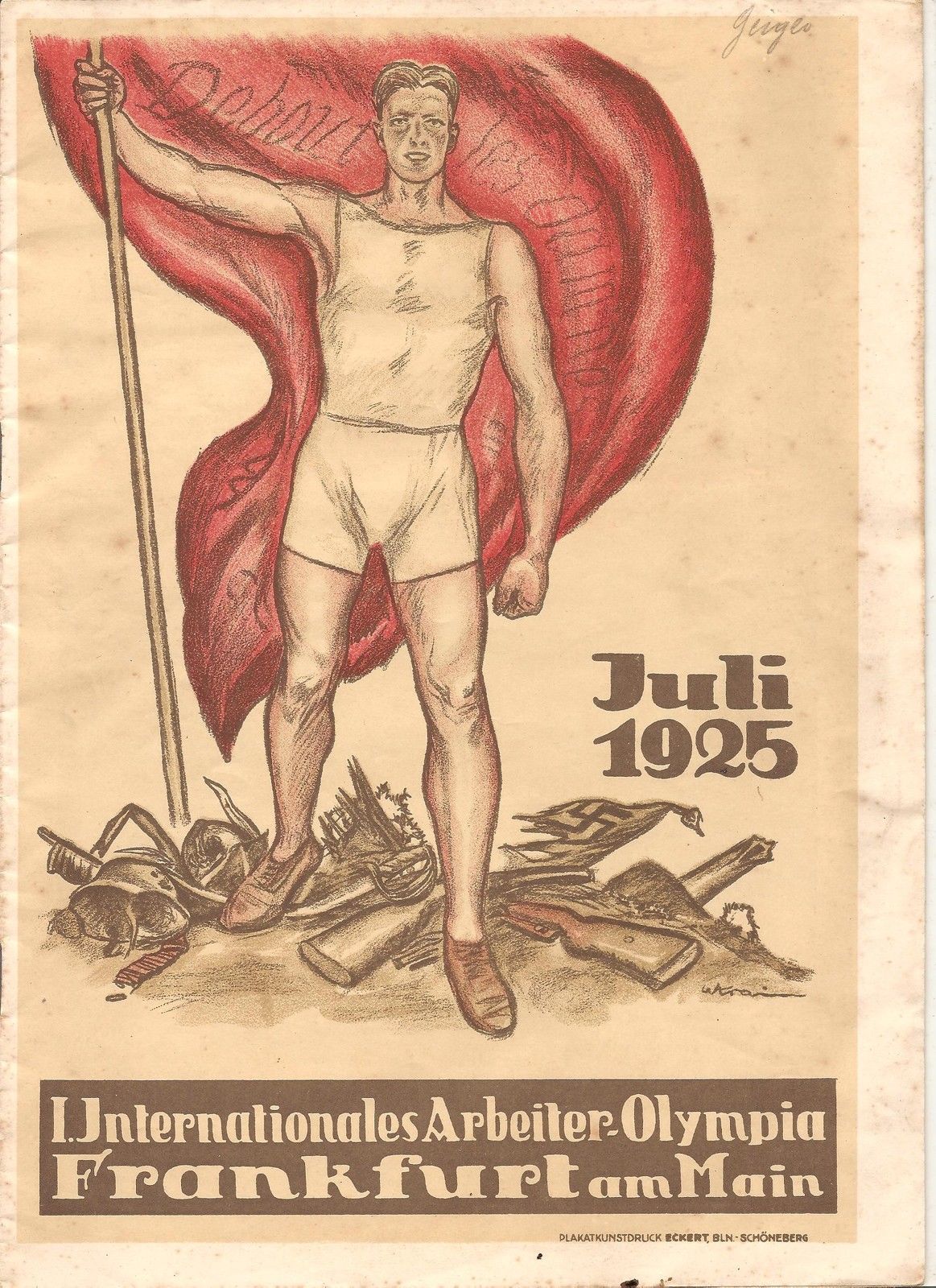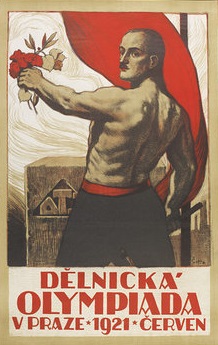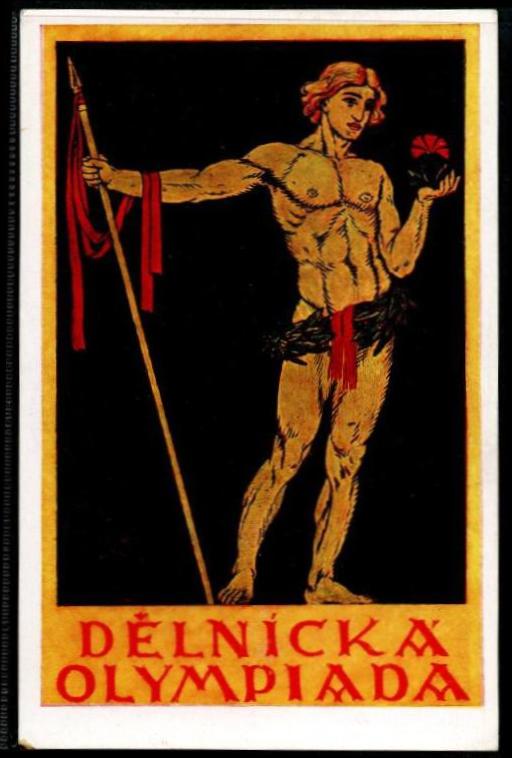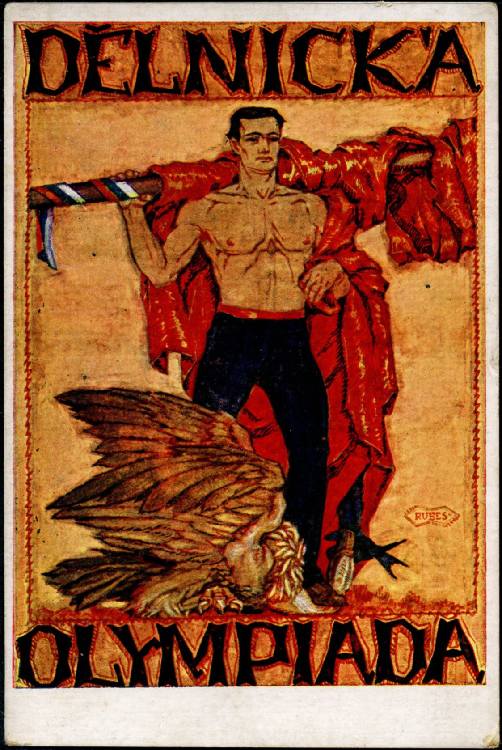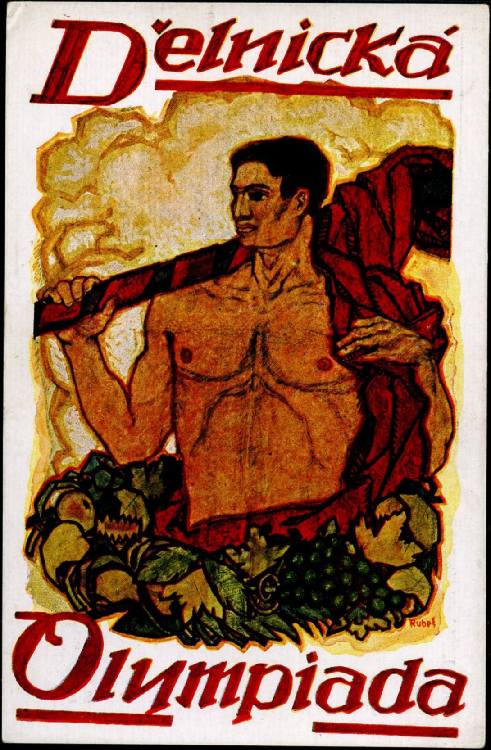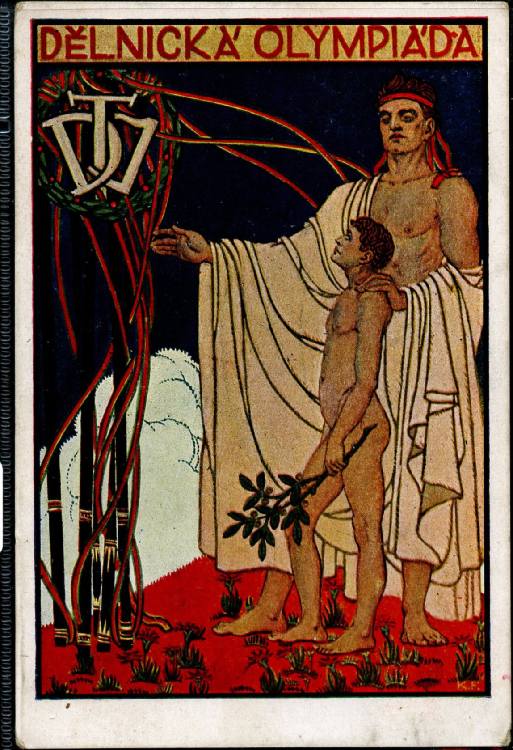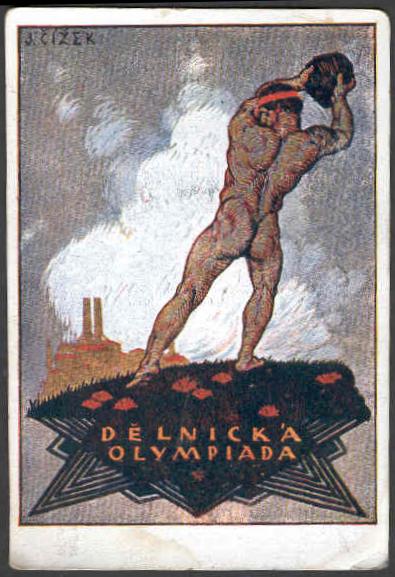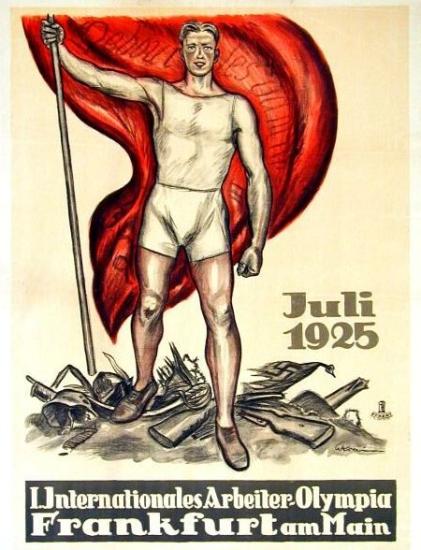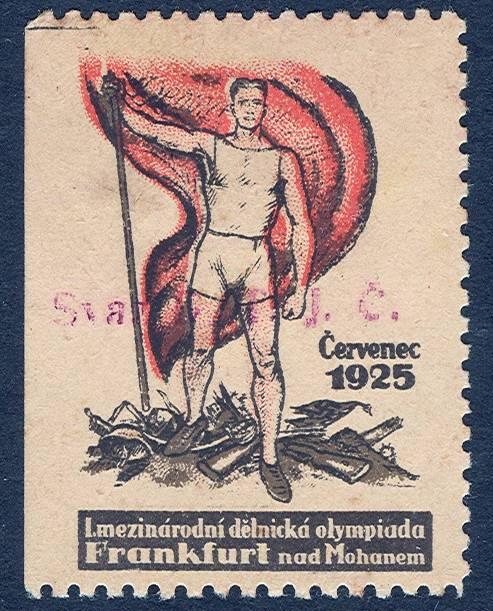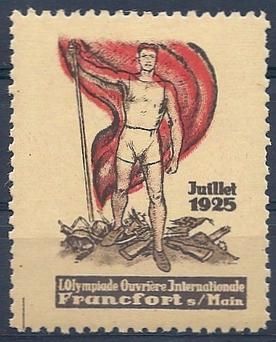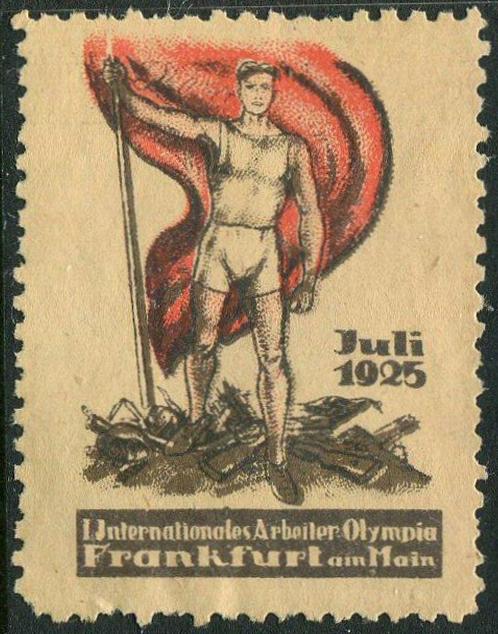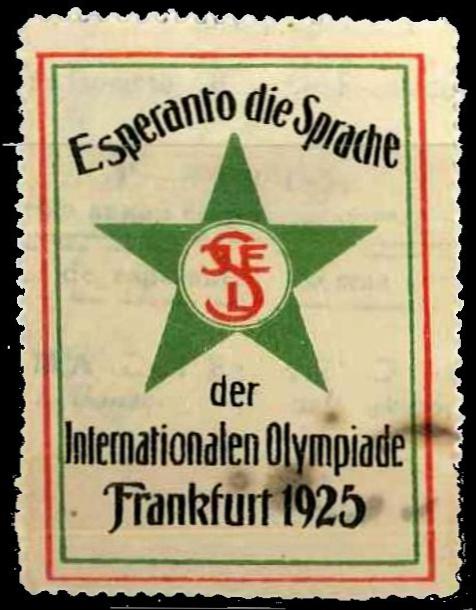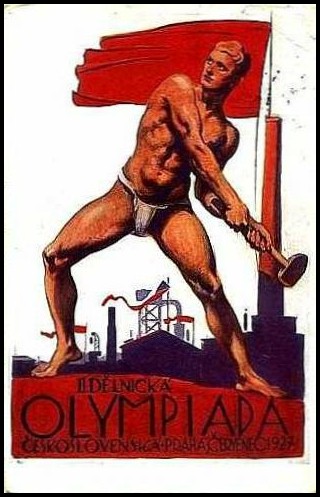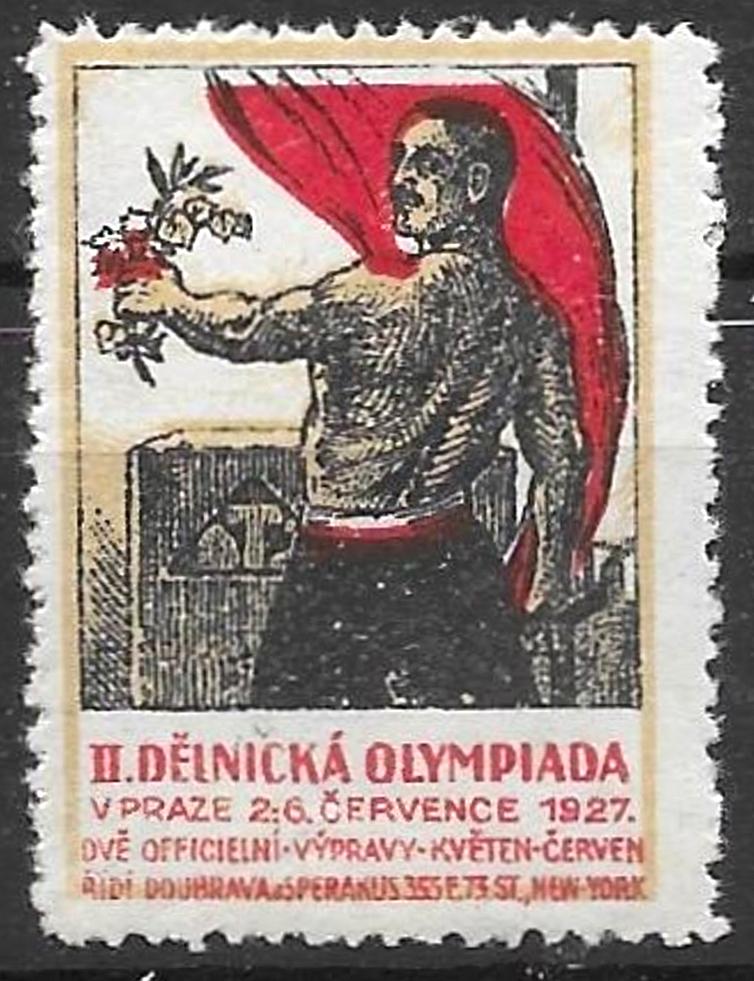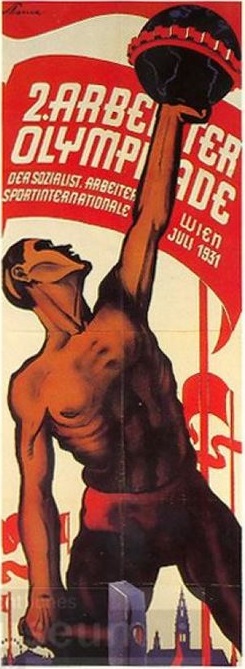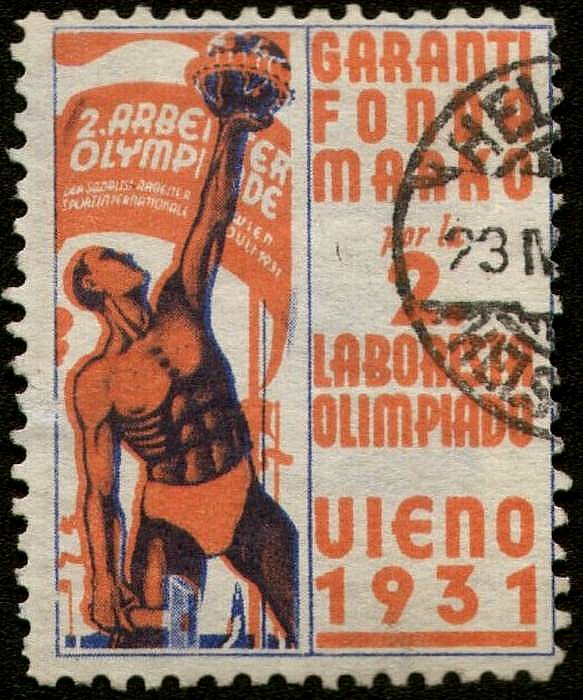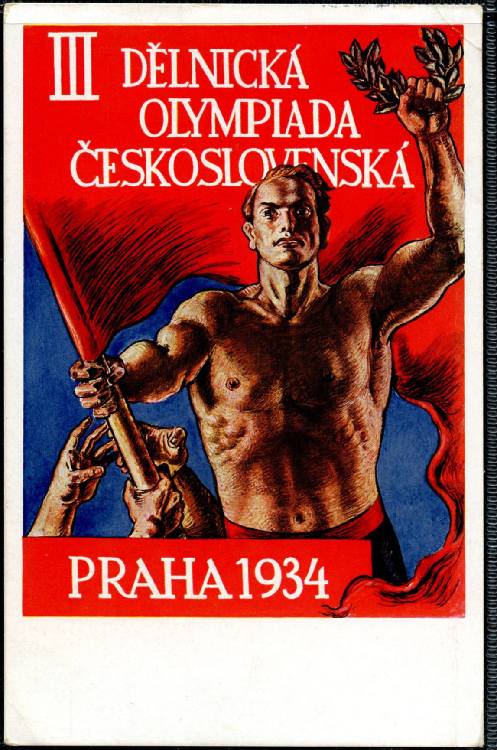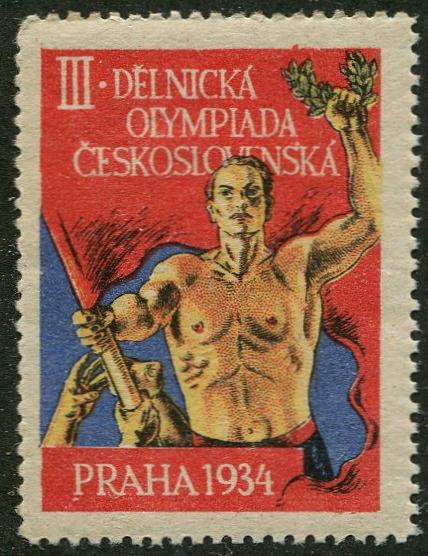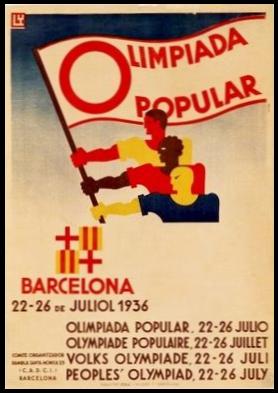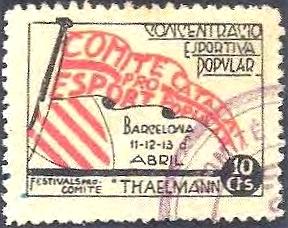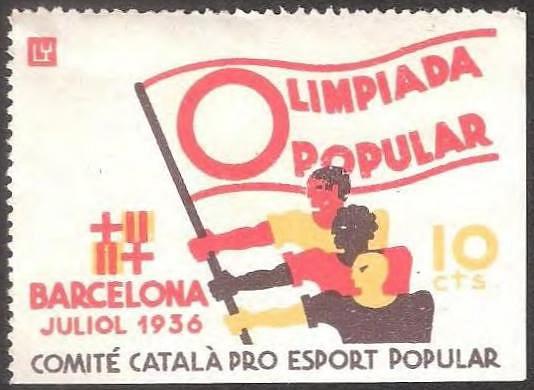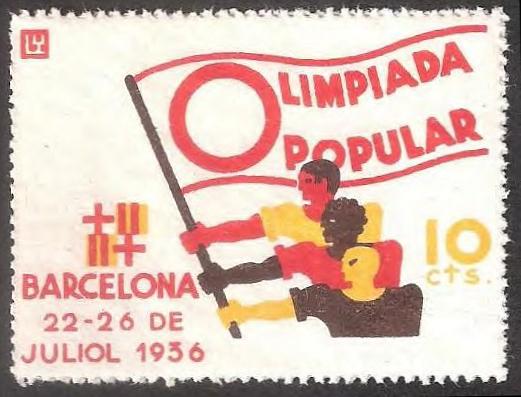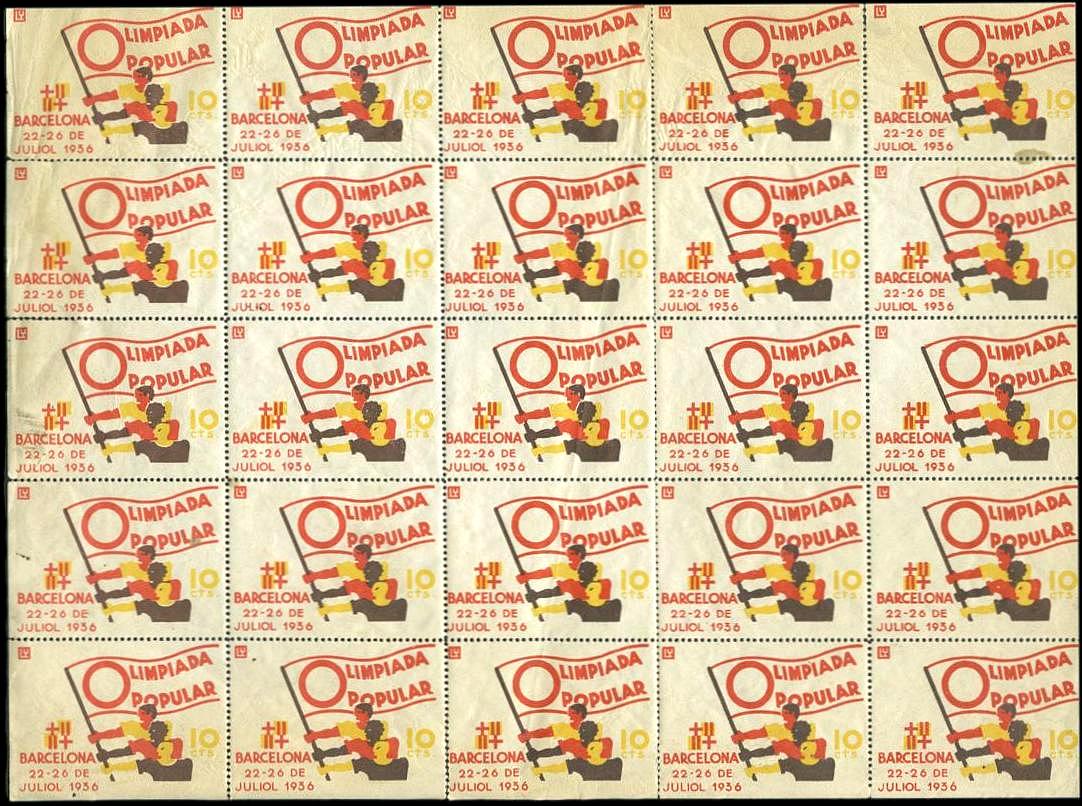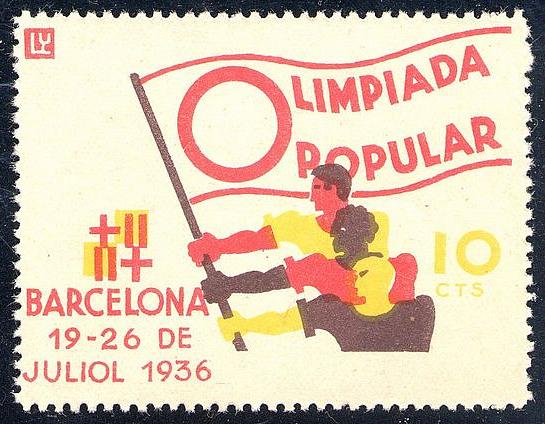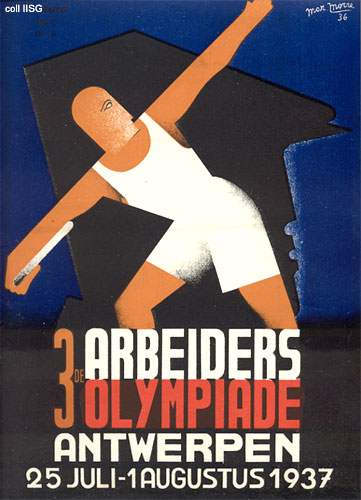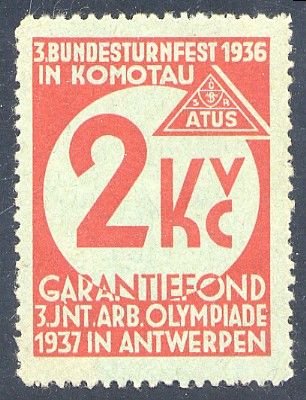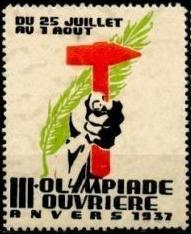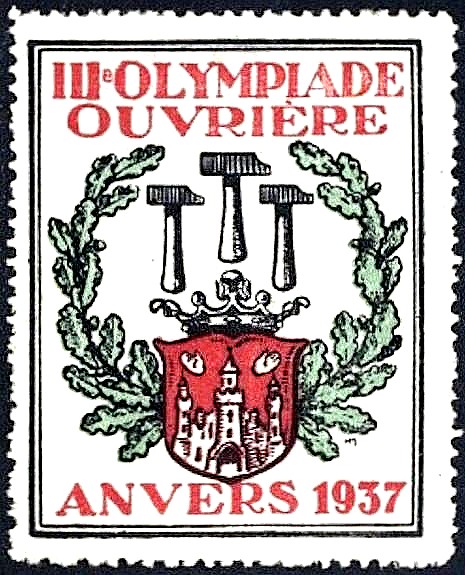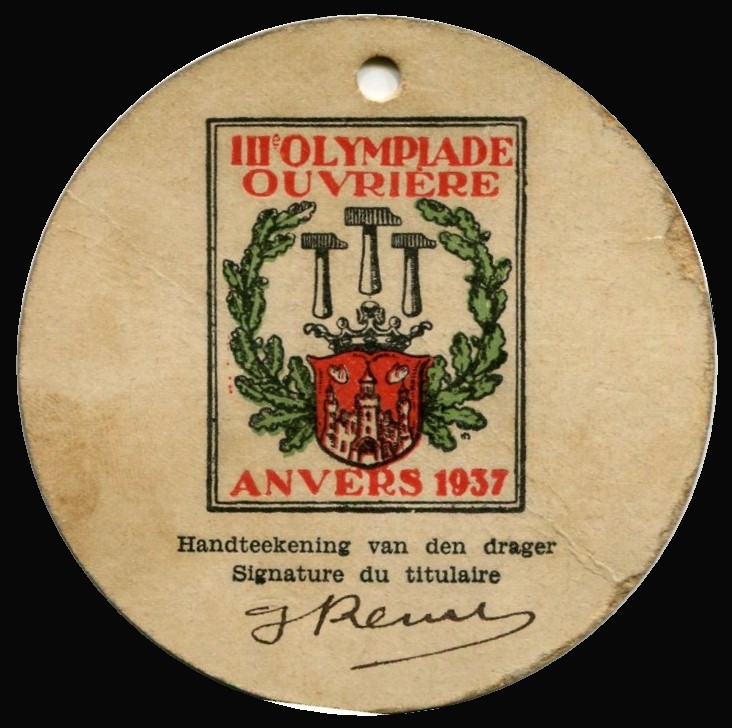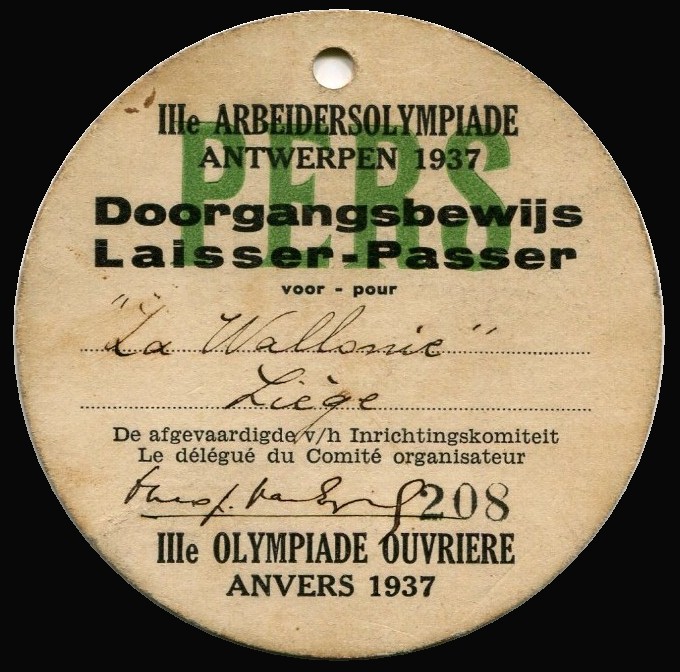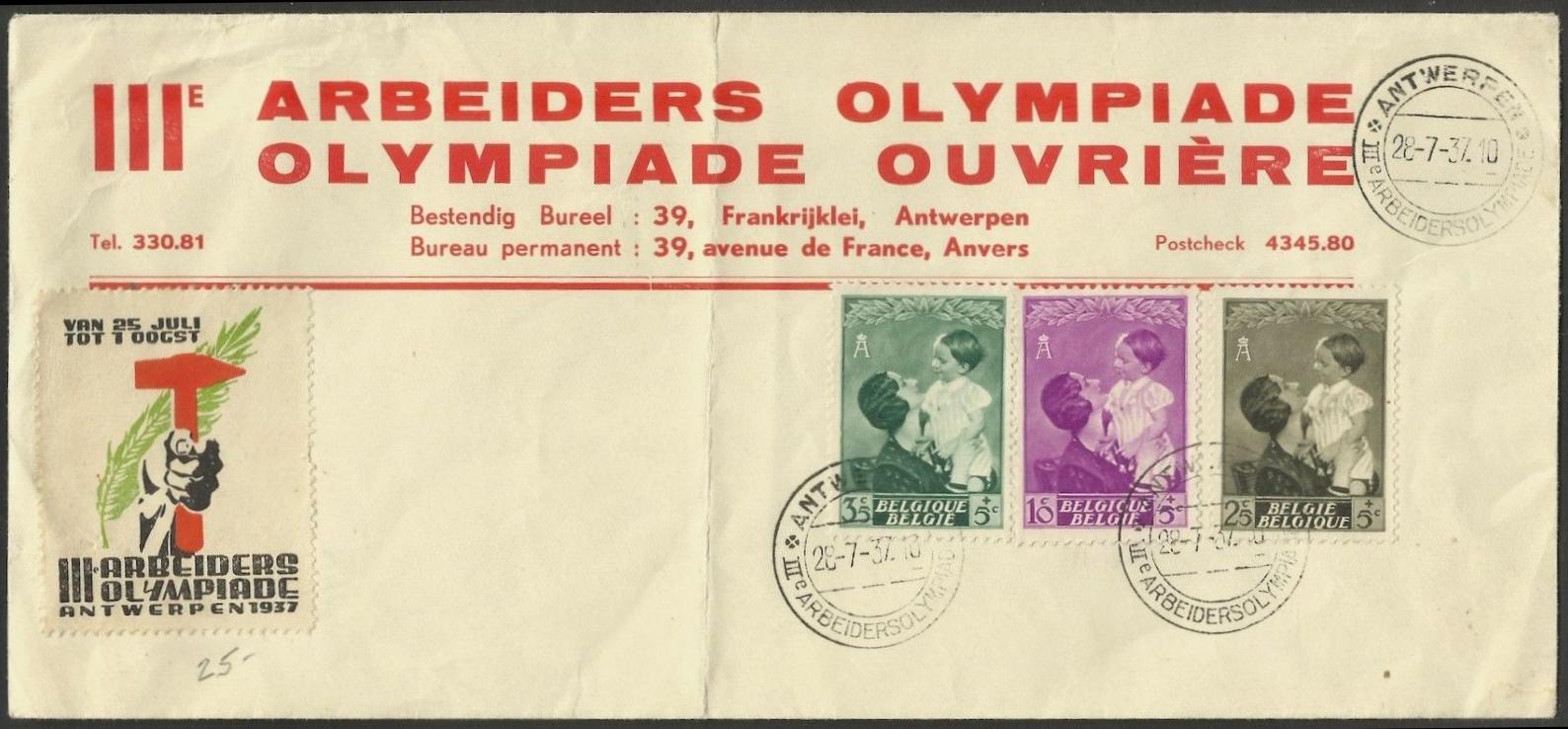POSTER STAMPS AND LABELS OF THE OLYMPIC GAMES
|
INTRODUCTION
SUMMER GAMES |
Workers' Olympics - Olympiades Ouvrières - Arbeiter-Olympiade
|
SOLVED MYSTERIES!
SUMMER GAMES
WINTER GAMES
OTHER TOPICS |
| YEAR | Location | EVENT |
| 1921 |
Prague, Czechoslovakia
Poster for 1921 Delnicka Olympiada. |
1st International Workers' Olympics - Unofficial
Workers' Gymnastic Union - Delnicke Telocvicne Jednoty - DTJ Czechoslovakia in the early 20th century had a strong tradition of sports organizations, especially the SOKOL movement, which was a covertly patriotic group founded in 1862. The Sokols held regular local, regional and national competitions called Slets, for which many postcards and poster stamps were created. You can view my extensive set of pages about Sokol postcards and labels HERE. In 1897, socialist Sokols split off to form the Delnicke Telocvicne Jednoty (DTJ), or Workers' Gymnastic Union, which in 1920 joined the newly-formed Socialist Workers' Sport International (SASI). An international Workers' Olympics was proposed, but the only SASI group with sufficient enthusiasm and structure to mount such an event was the DTJ, which held a Workers' Olympics in Prague in 1921. Athletes from thirteen countries participated. "In addition to competitive sports, the games featured mass artistic displays, choral recitals, political plays and singing of revolutionary songs." I have seen no poster stamps or labels advertising this event, but there are many postcards, some of which are shown below. |
|
POSTCARDS FOR THE 1921 WORKERS' OLYMPICS in PRAGUE
|
||
| 1925 |
Frankfurt, Germany
Poster for 1925 International Workers' Olympics |
1st International Workers' Olympics - Official
By 1925 SASI had developed to the point that it was able to mount the First Official Workers' Olympics in Frankfurt, Germany. 100,000 athletes from 12 countries competed, with 450,000 spectators. I have seen four poster stamps advertising this event, shown below. The first three reproduce the official poster, one with text in Czech, one in French, and one in German. There may be versions in other languages. The last stamp is a promotion for Esperanto. |
|
|
||
| 1927 |
Prague, Czechoslovakia
Postcard for 1927 Delnicka Olympiada |
II Delnicka Olympiada
The Czech DTJ just couldn't wait - they held another unoffical Workers' Olympics in Prague in 1927, spurred I suppose by the huge eighth National Slet the Sokols staged in 1926.
I have seen four labels advertising this event, shown below. That last image of the four stamps overprinted "II DELNICKA OLYMPIADA CESKOSLOVENSKA" raises the question What is the underlying stamp? HERE is an image of a full pane with the overprint. The stamps are numbered 1 thru 50, with "2H" on each stamp - for 2 Heller, the denomination. So what was the original use of the stamps? Just fund-raising? SVAZ DTJ CESKOSLOVANSKYCH = DTJ Union of Czechoslovakia |
|
|
||
| 1931 - Summer |
Vienna, Austria
Poster for 1931 Workers' Olympics |
2nd International Workers' Olympics, 1931 - Vienna, Austria
SASI mounted its second event in 1931. I have seen just one label advertising this event, shown below. |
|
|
||
| 1931 - Winter |
Mürzzuschlag, Austria
|
2nd International Workers' Winter Olympics, 1931 - Mürzzuschlag, Austria
I have seen two labels advertising this event, shown below. 7/17/18 - Philippe Pavard sent this one: Rüstet zur internat. Arbeiter-Wintersport Olympiade 1930/31 in Mürzzuschlag Österreich vom 5-8 Feber 1931 Get ready for the International Workers' Winter Olympics 1930/31 in Mürzzuschlag Austria from 5-8 February 1931 |
|
|
||
| 1934 |
Prague, Czechoslovakia
Postcard for 1934 Delnicka Olympiada |
III Delnicka Olympiada
The Czech DTJ just couldn't wait - they held another unoffical Workers' Olympics in Prague in 1934, spurred I suppose by the huge ninth National Slet the Sokols staged in 1932. I have seen one label advertising this event, shown below. It reproduces the image on the postcard, which must have been the official poster as well. |
|
|
||
| 1935 & 1936 |
Barcelona, Spain
Poster for 1936 People's Olympics |
Olimpiada Popular
The 1936 Berlin Olympics, sometimes referred to as Hitler's Olympics, were the most controversial Olympics until the Moscow Games of 1980. The USSR and Spain boycotted them, because they objected to the Nazi regime's anti-semitism and the Olympic Games' elitism. As an alternative, they organized a Workers Olympics (Olimpiada Popular), to be held in Barcelona, Spain. Socialist and workers organizations from many countries, including even a small team from the USA, agreed to participate, and by July 16, several days before these alternative Games were to begin, over 6,000 athletes from all over the world had assembled. Then, on July 17, the Spanish Civil War broke out, and most of the athletes fled. A few hundred stayed to join the fight. The vignettes below were issued for the event. You can read much more about these "Games that never were" by following the links below the images. The second reference offers lots of insight and detail about the stamps, but is in Spanish. I have run the relevant pages of that document through Google Translate and am providing a link to that as well - it's a bit crude, but readable. -------------- The first three labels below were issued in 1935 to publicize and raise funds for the Olimpiada. The fourth was issued in 1936 to promote the newly created Thälmann Cup, honoring Ernst Thälmann, an athlete and German communist leader who had been imprisoned by the Nazis since 1933; and as a practice run for the main event in June. The three labels below were issued in 1936 to promote and raise funds for the Games. The first, issued before the dates had been finalized, says simply July, 1936. The second, issued shortly later, announces the dates as July 22-26. The third, still later, announces the dates as July 19-26. They had to expand the calendar to accommodate the huge response! Considering the years of planning and preparation that go into an Olympics event today, it astonishes me they could (almost) bring it off so quickly. It helped that Barcelona had bid against Berlin for the official Olympics, so some major work had been done. References: 1. Thanks to Ray Petersen for sending me this scan of page 128 from "The Republican Political Labels 1936-1939" by F. Gomez-Guillamon - translated into English and published by Ronald G. Shelley in the UK in 1988 as part of a series of books by the Spanish Philatelic Society Bookclub. That got me started on this major revision of this section. (12/18/18) 2. JUEGOS OLÍMPICOS DE LOS TRABAJADORES. UNA VISIÓN ARTÍSTICA DESDE LAS VIÑETAS, Josep Sauret Pont, Universidad de Barcelona. Published in "Citius, Altius, Fortius" 2016, 9 (2), pp. 71-97. Available for download as a pdf file (in Spanish) HERE. This is a detailed and scholarly analysis and display of many of the vignettes on this page. CLICK HERE for a translation of the relevant pages. Further reading: The People's Olympiad of 1936: When Barcelona protested Hitler's games in Berlin The Olympics That Never Were: The People's Olympiad The Peoples Olympics Vs the Nazi Olympics 1936: A Choice of Politics to go with your Sport
|
|
|
||
| 1937 |
Antwerp, Belgium
Poster for 1937 Workers' Olympics |
III OLYMPIADE OUVRIERE / 3de ARBEIDERS OLYMPIADE
After the cancellation of the 1936 Workers' Olympics in Barcelona, the event was resecheduled for the following year in Antwerp. According to Wikipedia:
1937 Olympiad was a joint event with the Red Sport International organized Spartakiads. It was the first time a delegation from the Soviet Union took part at the Workers' Olympiad. German athletes no longer participated since the Workers' Gymnastics and Sports Federation of Germany had been banned by the Nazi regime in 1933. Below, a fund-raising label (in German) for the 1937 Workers Olympics, issued in 1936 during a gymnastics festival (turnfest) in Komotau (today Chomutov), Czechoslovakia (which was a German-speaking town at the time, part of the Sudetenland.) ATUS stands for "Sudetendeutsche Arbeiter-Turn- und Sportverband" (Sudeten German Workers' Gymnastics and Sports Association). Below, two poster stamps produced to advertise the competitions, and both sides of an official press pass for the event. 7/22/18 - an eBay offering - excellent! |
|
|
||
If you have information or images that can improve this website, please contact me at
posterstampcc@gmail.com
TOP
I am indebted to Robert J DuBois for allowing me to use images and information
from
his Catalog of Olympic Labels
on these web pages.
All text and images are the property of the author. Any errors are his.
REWARD! If you have better or additional information about anything shown or
discussed here, please Email the webmaster.
Email address at bottom of page. Full credit gladly given - your name, ebay ID,
web site...

Send feedback to the webmaster: CLICK HERE
Created -- 01/09/2017
Revised -- 06/17/2020
